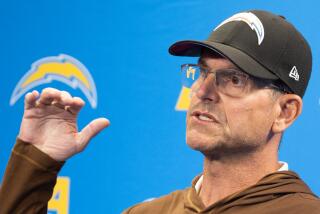Story Says UNLV Pair Got Cash : Magazine Reports Moses, Scurry Were Paid by Gambler
- Share via
Nevada Las Vegas basketball players Moses Scurry and David Butler reportedly received cash last October during a lunch at Caesars Palace with a man who twice has been convicted of sports bribery, according to a story in Time magazine’s April 3 edition, which was on newsstands Monday.
But Butler said by telephone from the UNLV basketball office Tuesday that he did not receive any money at the Oct. 18 lunch with a man he knew only as Sam Perry, who coached Scurry as a youngster in New York City.
Scurry could not be reached for comment.
Butler, asked if Scurry received money, said: “I really don’t know. You’d have to ask Moses about that.”
The magazine reported that Perry told Art Ross, a former coach in the Continental Basketball Assn., “I gave them a hundred bucks, so what?”
UNLV Coach Jerry Tarkanian said his understanding is that Scurry was given no more than “$20 to pay the tip for lunch or something.”
Perry, also known as Richard (the Fixer) Perry, according to the magazine, was convicted in 1974 in connection with a betting scandal at Roosevelt and Yonkers raceways in New York, and pleaded guilty in 1984 to conspiring to commit sports bribery as part of a Boston College point-shaving scheme, the magazine said.
Tarkanian said Monday that he knew Perry as Sam Perry and that Perry had told him he was “in commodities.”
Tarkanian said he met Perry in 1986 when Perry was one of a number of people to tell him that Lloyd Daniels, a talented New York high-school dropout, was interested in playing at UNLV.
Daniels signed a letter of intent to attend UNLV in 1986. In 1987, he was arrested in Las Vegas for allegedly attempting to buy rock cocaine.
Tarkanian announced afterward that Daniels would never play for UNLV, and says that Perry was outraged at that announcement and that he has not spoken to Perry since.
Tarkanian said UNLV has “no relationship in any way” with Perry, and that he “didn’t know anything” about Perry’s background until the magazine approached him.
National Collegiate Athletic Assn. rules prohibit athletes receiving extra benefits from people defined as representatives of a school’s athletic interests, a category that includes those who do such things as contribute money, attend booster functions or provide scouting information at the request of the staff.
“The whole thing is ridiculous,” Tarkanian said. “We have no relationship with Sam Perry. We have a million people come to Las Vegas. He coached (Scurry) or knew (Scurry).”
Rick Hilliard, a director of enforcement for the NCAA, said he was unaware of the report until asked to comment on it, but said that “potentially there could be a problem anytime a student-athlete receives money,” and that the key consideration could be whether the individual is classified as a representative of the school’s athletic interests.
“If he were involved in gambling or a known gambler, we would always be interested in reviewing the matter,” Hilliard said. “That’s always a sensitive matter. . . . Not only would the NCAA be interested, but also the Justice Department.”
More to Read
Go beyond the scoreboard
Get the latest on L.A.'s teams in the daily Sports Report newsletter.
You may occasionally receive promotional content from the Los Angeles Times.










